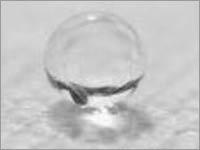 Superhydrophobic textile fabrics are prepared by a simple, one-step gas phase coating procedure by which a layer of polymethylsilsesquioxane nanofilaments is grown onto the individual textile fibers. A total of 11 textile fabrics made from natural and man made fibers are successfully coated and their superhydrophobic properties evaluated by the water shedding angle technique.
Superhydrophobic textile fabrics are prepared by a simple, one-step gas phase coating procedure by which a layer of polymethylsilsesquioxane nanofilaments is grown onto the individual textile fibers. A total of 11 textile fabrics made from natural and man made fibers are successfully coated and their superhydrophobic properties evaluated by the water shedding angle technique. A thorough investigation of the commercially relevant poly(ethylene terephthalate) fabric reveals an unparalleled long-term water resistance and stability of the superhydrophobic effect. Because of the special surface geometry generated by the nanoscopic, fibrous coating on the microscopic, fibrous textiles, the coated fabric remains completely dry even after two months of full immersion in water and stays superhydrophobic even after continuous rubbing with a skin simulating friction partner under significant load.
Furthermore, important textile parameters such as tensile strength, color, and haptics are unaffected by the silicone nano-filament coating. For the first time, an in-depth characterization of the wetting properties, beyond simple contact angle measurements, as well as a thorough evaluation of the most important textile parameters is performed on a superhydrophobic fabric, which reveals a true potential for application.
Related News
Photos
More>>trade
market
finance
- Celebs arrive at the 35th annual People's Choice awards in L.A.
- Magic Millions - David Jones Racing Fashion Preview
- Emporio Armani - Milan Menswear - Autumn/Winter 2009/10
- Burberry Prorsum - Milan Menswear Autumn/Winter 2009/10
- UK: Be a Girls Aloud-alike: The copycat clothing site that's beating the





